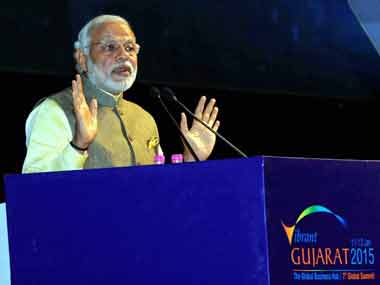As days pass, one thing is becoming clearer – prime minister Narendra Modi’s idea of inclusive development is hazy. His words and deeds contradict each other to the extent that one wonders whether his development agenda is inclusive at all. His speech at the Vibrant Gujarat Summit is the latest instance. In the 22-minute address, he laid out his government’s achievements in reforms and also his plans and aspirations for the country. The aim, clearly, was to sell India to global investors as an investment destination. “We are dreaming big and our dreams are numerous. Our dreams can become the seeds of your growth; our aspirations can propel your ambitions,” he told the gathering. [caption id=“attachment_2041305” align=“alignleft” width=“380”]  PM Modi at the Vibrant Guajrat summit. PTI image[/caption] To be sure, he said the government’s development process will not be restricted to one sector or one region. In other words, it will not be exclusive but inclusive. But the truth is the government’s recent move on Land Acquisition Act 2013 belies Modi’s promise of such an inclusive growth. For the uninitiated, the government had recently amended through an ordinance the Land Acquisition Act, 2013, enacted by the erstwhile UPA government. The ordinance was aimed at making land easily available for projects in sectors such as defence, rural roads, electrification, affordable housing, industrial corridors and infrastructure (including public private partnerships). To make it easier for companies to buy land, the ordinance removed two restrictions: permission from 70-80 percent of farmers and also the need for social impact assessment of the proposed project. Modi has been selling his land ‘reform’ saying it is pro-farmer and predevelopment step. He has claimed that the ordinance ensures faster processing without compromising on compensation or resettlement measures. At the Vibrant Gujarat too, extolled the land act amendments. Explaining how his government took policy-driven initiatives to improve ease doing business in India, Modi said the government has initiated steps to increase the supply of natural resources like coal and iron ore. “We also amended legal provisions to facilitate availability of land. This has been done to enable development in remote areas while ensuring better returning to the farming community,” he said. However, a closer look at the amendments will make it clear that they are least inclusive and most undemocratic. For one, the erstwhile Act had, in the most democratic and decentralised way, entrusted the power to decide whether the land is to be sold or not with the farmers as to sell the land consent of 70-80 percent of the owners was necessary. The ordinance has snatched this power away and this now lies with the government and the corporates. (In the case of tribal areas, termed Schedule V and Schedule VI areas, the consent clause stays.) It is the compensation aspect that makes the ordinance least inclusive. As per the ordinance, for rural land farmers will be given a compensation of four times the market price and for urban land the compensation will be two times the market price. In a truly inclusive project, the affected farmers should also be able to get a stake in the project, which will ensure incremental income going forward from the land they sold. As per the ordinance, farmers receive their compensation just once. Modi’s claim that the amendment will ensure better returns for farmers, thus, is hollow. The removal of the need for assessing the social impact of projects will also have far reaching results, especially on agricultural output and the life of the displaced farmers. Ideally, what the government should have done is to make provision to speed up the process of studying the social impact rather than revoking it overall. In short, as this article in the Business Standard says, the government’s ordinance has returned the “near absolute power of discretion into the hands of the collector, the bureaucracy and the political class yet again”, which in no way is inclusive or democratic. Clearly, Modi is for everything big: big dreams, dams and also claims. In his league of big things, smaller things, like inclusive growth, find very little space.
Clearly, Modi is for everything big: big dreams, dams and also claims. In his league of big things, smaller things, like inclusive growth, find very little space.
Advertisement
End of Article


)

)
)
)
)
)
)
)
)



